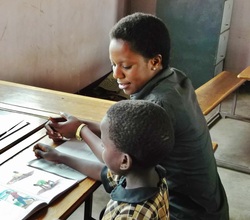
While speaking with the teachers at Pakachele for my research on energy poverty and education, I asked their opinion on how the children were affected by their lack of electricity. While they are too young to study more than one subject each night, I was interested to hear what the teachers observed on the effects of energy poverty. The vast majority of these students, Grade 1 to 5, rely on candles for all of their lighting needs. One teacher, Francis Zulu, notices a difference between students who have access to a radio and those without it. He believes the students without radio or television miss out on educational programs and feel embarrassed when other students talk about it.
The problem of embarrassment and self-esteem issues came up often. The school counselor, Theresa B. Kasonde took a moment to explain that “students feel inferior if there is no electricity at home. They isolate themselves, and will not raise their hands in class even when they know the answer”. When Ms. Kasonde meets with students who are having a difficult time, she has them draw their situation at home; their treatment at home can lead to an inferiority complex that the teachers work hard to combat. They encourage and support the students, and track their progress in and out of the classroom.
The vulnerable children of Pakachele Primary School are well cared for thanks to the support of the wonderful teachers there. They do not teach do get rich, and all admitted that there was nothing else they would rather do but teach. For the students who have so little, the 8 teachers and 1 counselor at the school must be jacks of all trades. They are teachers, confidants, and Lifelines for the vulnerable students in Ng’ombe, Lusaka.
 RSS Feed
RSS Feed